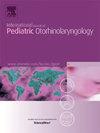基于多阶段优化策略的术后强化恢复在鼾症患儿日间手术护理管理中的应用。
IF 1.3
4区 医学
Q3 OTORHINOLARYNGOLOGY
International journal of pediatric otorhinolaryngology
Pub Date : 2024-10-05
DOI:10.1016/j.ijporl.2024.112123
引用次数: 0
摘要
目的和目标:本研究旨在探讨在对鼾症日间手术患儿的护理管理中,应用多阶段优化策略(MOST)加强术后恢复(ERAS)方案的有效性:背景:虽然国际学者已将多阶段优化策略应用于戒烟、艾滋病管理和减肥等行为干预研究,但其在构建护理干预项目中的应用仍相对欠缺:方法:采用方便抽样法、随机对照试验法:方法:采用便利抽样法。研究招募了 200 名被诊断为打鼾的学龄前儿童,他们于 2023 年 1 月至 2024 年 1 月期间在一家特定医院接受了日间手术。参与者被分为两组:对照组接受标准护理,实验组接受 MOST 指导下的综合优质护理计划,该计划专为接受日间手术的打鼾患儿设计,并遵循 ERAS 既定指导方针:与对照组相比,实验组患儿在术前等候区和返回病房时的焦虑程度明显降低(P 0.01),对照组和实验组患儿对出院指导的内容、护士指导的效果和技巧的感知存在显著差异(P 0.01):结论:在对接受日间手术的打鼾患儿进行护理管理的过程中,实施经MOST强化的ERAS方案效果显著。该方法可有效降低患儿术前焦虑,提高对家长的出院指导质量,明显降低术后口渴、饥饿、哭闹、吸入、疼痛的发生率,减少术后6 h内非计划住院转院的需求:为日间手术打鼾患儿提供快速康复护理很有必要。护理人员应采用基于多阶段优化策略的快速康复理论,促进患儿术后快速康复。本文章由计算机程序翻译,如有差异,请以英文原文为准。
Application of enhanced recovery after surgery based on multiphase optimization strategy in the nursing management of children with snoring disease day surgery
Aims and objectives
This study aimed to investigate the effectiveness of applying a multiphase optimization strategy (MOST) to enhance recovery after surgery (ERAS) protocols within the nursing management of children undergoing day surgery for snoring disease.
Background
While MOST has been applied to behavioral intervention research in smoking cessation, AIDS management, and weight loss by international scholars, its application in constructing nursing intervention projects remains relatively unexplored.
Design
Using convenience sampling, randomised controlled trial.
Methods
A convenience sampling method was employed. The study recruited 200 preschool children diagnosed with snoring who underwent day surgery at a specific hospital between January 2023 and January 2024. The participants were divided into two groups: a control group receiving standard nursing care and an experimental group receiving MOST-guided, integrated high-quality nursing plans specifically designed for children with snoring undergoing day surgery, adhering to established ERAS guidelines.
Results
Children in the experimental group exhibited significantly lower anxiety levels compared to the control group, both in the preoperative waiting area and upon returning to the ward (p < 0.01). While the quality of discharge teaching scale (QDTS) scores did not reveal a statistically significant difference between the groups (p > 0.01), the content of discharge instructions and the perceived effectiveness and skill of nurse guidance differed significantly between the control and experimental groups(p < 0.01). Notably, the experimental group experienced a demonstrably lower incidence of thirst, hunger, crying, aspiration, pain, and conversion of day ward to routine hospitalization mode compared to the control group (all p < 0.01). There was no significant difference in the incidence of postoperative nausea and vomiting between the groups after rehydration (p > 0.01).
Conclusions
The implementation of ERAS protocols enhanced by MOST within the nursing management of children with snoring undergoing day surgery demonstrates significant efficacy. This approach can effectively reduce preoperative anxiety in children, improve the quality of discharge guidance provided to parents, and demonstrably decrease the occurrence of postoperative thirst, hunger, crying, aspiration, pain, and the need for unplanned hospitalization transitions within 6 h after surgery.
Relevance to clinical practice
It is necessary to provide fast rehabilitation nursing for children with snoring during daytime operation. Nurses should adopt the theory of fast rehabilitation based on multi-stage optimization strategy to promote children's fast rehabilitation after operation.
求助全文
通过发布文献求助,成功后即可免费获取论文全文。
去求助
来源期刊
CiteScore
3.20
自引率
6.70%
发文量
276
审稿时长
62 days
期刊介绍:
The purpose of the International Journal of Pediatric Otorhinolaryngology is to concentrate and disseminate information concerning prevention, cure and care of otorhinolaryngological disorders in infants and children due to developmental, degenerative, infectious, neoplastic, traumatic, social, psychiatric and economic causes. The Journal provides a medium for clinical and basic contributions in all of the areas of pediatric otorhinolaryngology. This includes medical and surgical otology, bronchoesophagology, laryngology, rhinology, diseases of the head and neck, and disorders of communication, including voice, speech and language disorders.

 求助内容:
求助内容: 应助结果提醒方式:
应助结果提醒方式:


